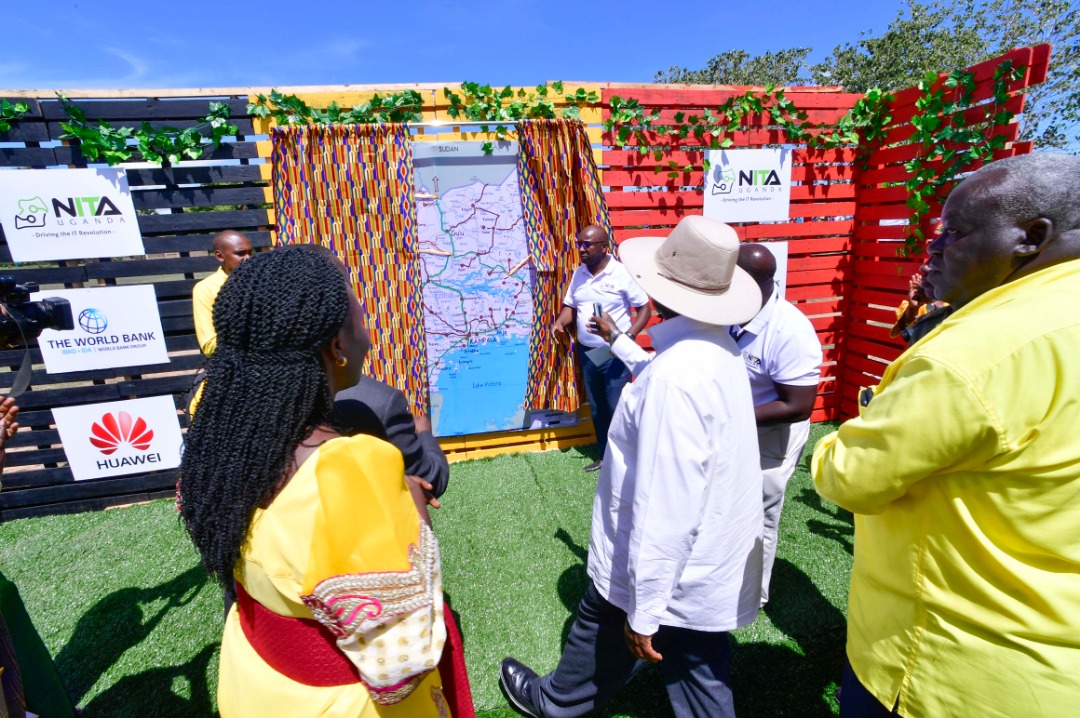President Yoweri Museveni has launched phase four of the National Backbone Infrastructure Connectivity project for West Nile.
The ceremony took place at St. Charles Lwanga Senior Secondary School grounds in Koboko District.
The government of Uganda through the National Information Technology, Uganda (NITA-U), with funding from the World Bank, is implementing the national backbone infrastructure and e-government infrastructure project to connect districts and towns across the country.
Phase four has commenced and will extend to the districts of Pakwach, Nebbi, Arua, Yumbe, Koboko, Adjumani, Katakwi and the border points of Oraba, Vurra, and Mpondwe. It will improve access, reliability, and competitiveness of broadband services both domestically and regionally. It will also provide the new international connections to neighboring countries including South Sudan and Eastern Democratic Republic of Congo (DRC) as well as helping position Uganda as a regional communication hub and bring public services closer to people, with 100 government offices in the areas of West Nile and Karamoja to be connected.
President Museveni, who was received by jubilating and cheering massive crowds and NRM supporters, was also endorsed as the sole candidate for the West Nile Region for the year 2021.
In his address to the people at the function, President Museveni said it was important for West Nile to have underground Internet cables because the facility would make work be faster and easier.
“These computers that work like human brains need to be connected by underground cables. We already did this in Kampala. We need to have the same done for West Nile. This is very important because it will help auditors and accountants get international jobs without moving to other countries,” he said.
The President also observed that connecting underground cables would make learning in schools easier and lessen the burden of parents buying books for their children since they would just connect and search from the computer.
The President also noted that while the government was playing its role of development in West Nile Region, it was incumbent on the people to create wealth for themselves in their homesteads, a role that would, in turn, lead to creating jobs for others.
He reiterated that creating jobs in Public Service cannot cater for all the people in Uganda and hence the necessity of starting projects that create wealth for them and help others to get employment.
“The total number of government jobs is 490,000 yet the population of Uganda is 41 million people. It means the government jobs can only cater for 2.8 million,” he said.
Information, ICT and Communications Minister, Frank Tumwebaze, thanked the World Bank and Huawei Company for connecting West Nile and Karamoja. He noted that the project had not only brought about connectivity but also employment opportunities.
World Bank Country Manager, Anthony Thompson, the project would reduce the crises of the Internet in Uganda and open up new opportunities for the people of West Nile. He added that the project is a testimony of collaboration between the Government of Uganda and the World Bank.
“We have 400 government facilities connected and we hope to have over 1,000 more offices connected. This digital transformation will reduce poverty by 1% because it will employ Ugandans. We are proud to be a leading partner to the African Union on this Agenda. We also hope to build digital skills, digital payment systems, and digital entrepreneurship,” he said.
Earlier, President Museveni commissioned Koboko pipe water supply and sanitation project in Kochi village to supply Koboko town clean water.
State Minister for Water, Ronald Kibuule, said bringing water to Koboko is in fulfillment of the NRM Manifesto. He said that the Shs.33.9billion project has the capacity to serve 10,000 people. He challenged the residents to take good care of the environment to ensure a sustainable water supply.




